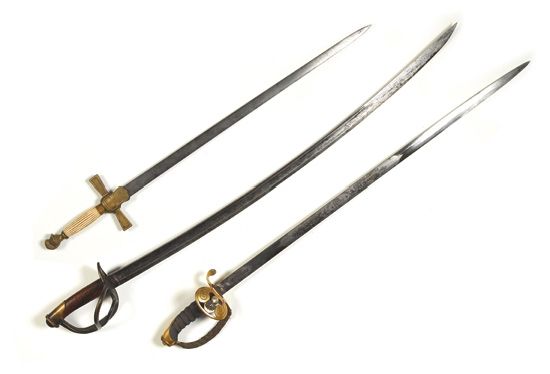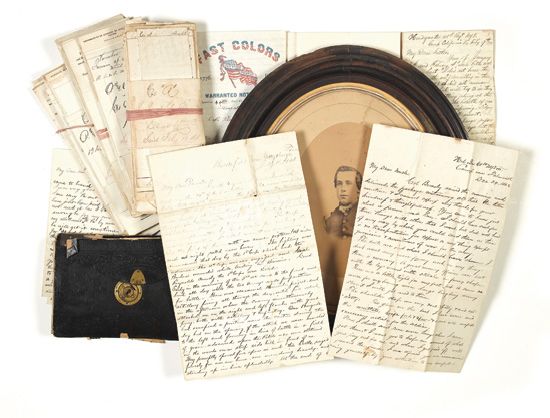Sale 2287 - Lot 185
Price Realized: $ 46,000
Price Realized: $ 55,200
?Final Price Realized includes Buyer’s Premium added to Hammer Price
Estimate: $ 10,000 - $ 15,000
"VERY LIKELY WE'LL NEVER SEE THE SUN SET" (CIVIL WAR--NEW YORK.) Correspondence and papers of Capt. Isaac Plumb, with three swords. Several hundred items (3 linear feet), including approximately 185 letters written by Plumb in the service, 1861-84; 115 letters received by him while in the service; 20 of his pre-war letters, 1859-61; approximately 100 regimental documents and 1864 account book; a binder of transcripts of Plumb's letters; Plumb's cardboard wallet; 3 swords; and more. Vp, 1859-65
Additional Details
Isaac Plumb (1842-1864) of Sherburne, NY enlisted in the 61st New York Infantry, and worked his way up to captain in March 1863. His hard-fighting regiment was commanded by Francis Channing Barlow and then Nelson Miles, both of whom later gained prominence as generals, and saw action during many of the major battles of the war, from Antietam to the Wilderness. Plumb survived all of these, but died in July 1864 from wounds suffered at Cold Harbor. This extensive archive covers every aspect of Plumb's Civil War service, from his recruitment, through his rise through the ranks, to his final days. It includes approximately 185 of his letters from the front, often expressing resignation that he would not survive the war.
The 61st saw its first combat at Fair Oaks, where Plumb's company lost 19 of its 41 men, dead or wounded; he was grazed by two bullets. He writes to his friend Will: "You need not make much calculations on ever seeing my face at those Sunday dinners again. The Rebels are determined and will dispute every inch of ground to Richmond. They fight well, you better believe" (2 June 1862). The 61st had great success at Antietam: "We began to advance upon them and show the bayonet, which they did not like the looks of at all. They gave us a dreadfull fire though of shell & bullets, but we pressed them on till we came in front of a ditch . . . in which laid a line of the enemy. Here we made a grand charge and few who did not surrender lived to tell the tale of their defeat" (21 September 1862). Fredericksburg was worse: "Had to cross a kind of a marsh or mud hole, and many a poor fellow was wallowing in the mud, in the last agonies of death" (17 December 1862). Writing from the field of battle on the evening after Chancellorsville on 3 May 1863, he reports prematurely on the death of his badly wounded colonel Nelson Miles: "we mourn his death much" (Miles lived for sixty more years). At Gettysburg, the regiment went into battle with fewer than a hundred men, and lost 65 of them; Plumb notes that "If we had remained in the fight a short time longer there would have been none of us left." Plumb was knocked down by a musket shot to his chest, but the force was blunted by a silver pencil and two keys in his pocket. When he rejoined his men in the fight, "their eyes stuck out . . . for most of them saw me fall and supposed I was killed" (4 July 1863). After two weeks of hard fighting at Spotsylvania Court House, Plumb wrote: "It is dreadfull work, this marching up to a line of earthworks filled with Rebels who are pouring a constant shower of bullets, grape and cannister in our very faces. When we are ordered in, we make up our minds that very likely we'll never see the sun set" (19 May 1864).
Captain Plumb's luck finally ran out at Cold Harbor on 11 June 1864. Sergeant James Grady sent a hastily scrawled note to Plumb's father: "Ike was wounded yesteday trugh the right leg & the right arm, but they are only flesh wounds" (12 June 1864). Plumb's father rushed from New York to the hospital to visit, writing letters back to the family to report on Ike's condition. The papers from Ike's wallet at the time of his injury have been kept separate in this collection, and include several letters from friends, as well as painfully scrawled notes to his friends. One reads: "Bob: Come up to Campbell Hosp & see me. I am wounded in two places & am almost helpless" (15 June 1864). He died in the hospital on the Fourth of July.
In addition to the extensive correspondence, this archive includes photographs of Captain Plumb and other soldiers; Plumb's pencil sketch of his company headquarters near Falmouth, VA in January 1863; and an unrecorded printed broadside poem about Colonel Barlow titled "Chant of the Veterans." Also included are three swords from the family collection. Plumb had corresponded with his uncle in December 1862 about the purchase of an appropriate officer's sword. with--a collection of related family papers: his father's account books, militia papers, genealogical notes, etc., 1767-1895. Provenance: bequeathed by Plumb's niece Margaret Grant Plumb to the consignor.
This is one of the most comprehensive and poignant Civil War archives to come on the market in recent years, with hundreds of letters, describing some of the heaviest fighting of the war.
The 61st saw its first combat at Fair Oaks, where Plumb's company lost 19 of its 41 men, dead or wounded; he was grazed by two bullets. He writes to his friend Will: "You need not make much calculations on ever seeing my face at those Sunday dinners again. The Rebels are determined and will dispute every inch of ground to Richmond. They fight well, you better believe" (2 June 1862). The 61st had great success at Antietam: "We began to advance upon them and show the bayonet, which they did not like the looks of at all. They gave us a dreadfull fire though of shell & bullets, but we pressed them on till we came in front of a ditch . . . in which laid a line of the enemy. Here we made a grand charge and few who did not surrender lived to tell the tale of their defeat" (21 September 1862). Fredericksburg was worse: "Had to cross a kind of a marsh or mud hole, and many a poor fellow was wallowing in the mud, in the last agonies of death" (17 December 1862). Writing from the field of battle on the evening after Chancellorsville on 3 May 1863, he reports prematurely on the death of his badly wounded colonel Nelson Miles: "we mourn his death much" (Miles lived for sixty more years). At Gettysburg, the regiment went into battle with fewer than a hundred men, and lost 65 of them; Plumb notes that "If we had remained in the fight a short time longer there would have been none of us left." Plumb was knocked down by a musket shot to his chest, but the force was blunted by a silver pencil and two keys in his pocket. When he rejoined his men in the fight, "their eyes stuck out . . . for most of them saw me fall and supposed I was killed" (4 July 1863). After two weeks of hard fighting at Spotsylvania Court House, Plumb wrote: "It is dreadfull work, this marching up to a line of earthworks filled with Rebels who are pouring a constant shower of bullets, grape and cannister in our very faces. When we are ordered in, we make up our minds that very likely we'll never see the sun set" (19 May 1864).
Captain Plumb's luck finally ran out at Cold Harbor on 11 June 1864. Sergeant James Grady sent a hastily scrawled note to Plumb's father: "Ike was wounded yesteday trugh the right leg & the right arm, but they are only flesh wounds" (12 June 1864). Plumb's father rushed from New York to the hospital to visit, writing letters back to the family to report on Ike's condition. The papers from Ike's wallet at the time of his injury have been kept separate in this collection, and include several letters from friends, as well as painfully scrawled notes to his friends. One reads: "Bob: Come up to Campbell Hosp & see me. I am wounded in two places & am almost helpless" (15 June 1864). He died in the hospital on the Fourth of July.
In addition to the extensive correspondence, this archive includes photographs of Captain Plumb and other soldiers; Plumb's pencil sketch of his company headquarters near Falmouth, VA in January 1863; and an unrecorded printed broadside poem about Colonel Barlow titled "Chant of the Veterans." Also included are three swords from the family collection. Plumb had corresponded with his uncle in December 1862 about the purchase of an appropriate officer's sword. with--a collection of related family papers: his father's account books, militia papers, genealogical notes, etc., 1767-1895. Provenance: bequeathed by Plumb's niece Margaret Grant Plumb to the consignor.
This is one of the most comprehensive and poignant Civil War archives to come on the market in recent years, with hundreds of letters, describing some of the heaviest fighting of the war.
Exhibition Hours
Exhibition Hours
Aliquam vulputate ornare congue. Vestibulum maximus, libero in placerat faucibus, risus nisl molestie massa, ut maximus metus lectus vel lorem.






